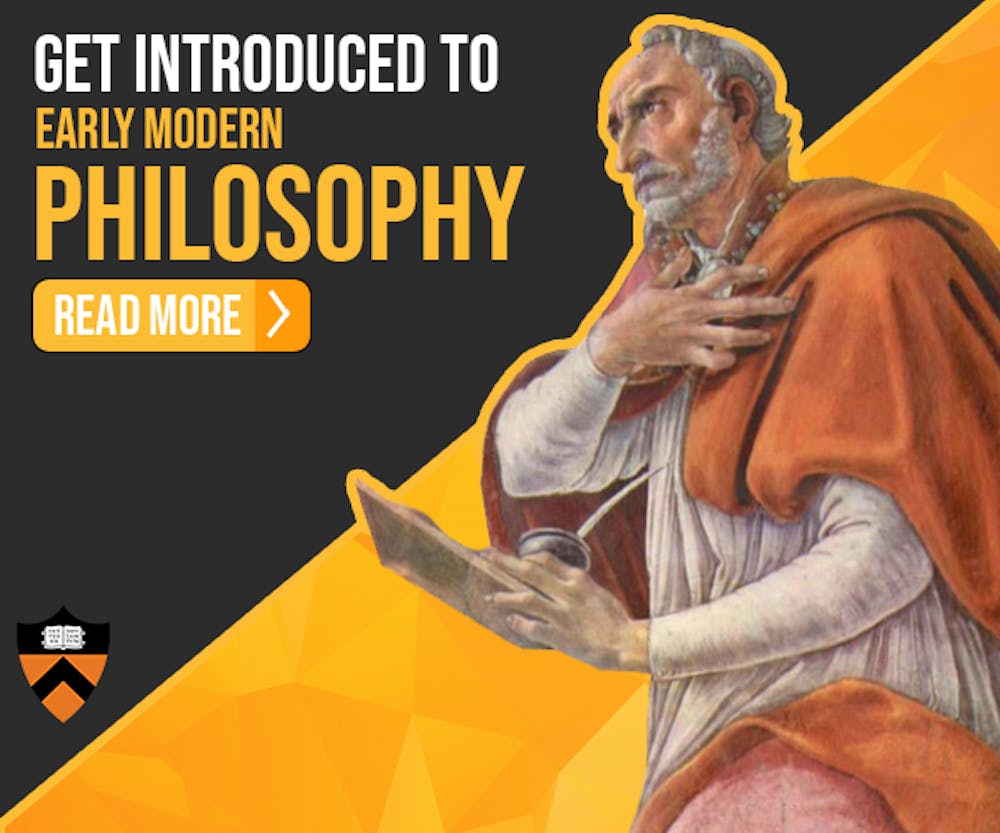This article was created by 48U Studios, the Daily Princetonian’s brand marketing studio. The Daily Princetonian’s editorial staff was not involved in the production of this article.
Summary: If you are a Princeton University student, please check out and consider taking one of these four fantastic spring 2021 philosophy courses: PHI 332 Early Modern Philosophy (EC) with Christia Mercer, PHI 201 Introductory Logic (EC) with Hans Halvorson, PHI 302 British Empiricism (EC) with Daniel Garber, PHI 338 Philosophical Analysis from 1900 to 1950 (EC) with Thomas Kelly.
You can add the courses through TigerHub starting at 6:30 AM EDT on January 18, 2021 until 11:59 PM EDT on Friday, February 12, 2021.
Read more about these Spring 2021 courses and some of the many benefits of taking a philosophy course below.
**************
What makes me who I am? What is the relationship between justice and good consequences? Are there truths that cannot be known?
Whether you have a passion for tackling complex questions about knowledge, reality and existence, a curiosity about early philosophers like Plotinus and Augustine, or are just looking to take an engaging epistemology and cognition class, Princeton’s philosophy department offers a diverse selection of courses taught by world-renowned scholars. Through these courses, you will not only learn about different branches of philosophy, read rich historical and contemporary texts, and get an introduction to on-going philosophical research, you will also learn to construct and evaluate arguments, a valuable skill that can be applied to any field of study, to most careers (especially law), and to life. To learn more about the Department of Philosophy, please visit their website.
If you are a Princeton student looking to broaden your intellectual horizons, please check out and consider taking one of the four fantastic spring 2021 philosophy courses listed below - especially PHI 332 Early Modern Philosophy (EC) which, for this semester only, will be taught by Christia Mercer, a Laurance S. Rockefeller Visiting Professor for Distinguished Teaching (2020-2021). From Introductory Logic to British Empiricism, there’s a philosophy course waiting for you! For more information on grading, reading lists, or course evaluations, please click on the course titles below or search the course on the Office of the Registrar’s Course Offerings site.

You can add any of the recommended courses listed below through TigerHub starting at 6:30 AM EDT on January 18, 2021 until 11:59 PM EDT on Friday, February 12, 2021. For more information about the add/drop period, please visit here.
1. PHI 332, Early Modern Philosophy (EC), Christia Mercer
We will track the development of a set of ideas that are central to early modern thought, but have not been properly studied, namely, the role that affective states, physical suffering, sympathy, and love play in the acquisition of ultimate knowledge. Authors include well-known thinkers like Plotinus and Augustine and understudied medieval women like Julian of Norwich and Teresa of Ávila. The course will conclude with a thorough examination of the only work by the seventeenth-century English philosopher, Anne Conway.
Schedule/Classroom Assignment:

S01: 1:30 - 4:20 PM on Tuesdays
Sample Reading List (See instructor for complete list.):
Plotinus, On Beauty
Augustine, Confessions
Teresa of Ávila, Interior Castle
Reading/Writing Assignments:
Weekly response to reading (200-300 words)
Papers: Midterm paper (4-5 pp); final paper (10-12 pp).
Requirements/Grading:
Paper in lieu of final - 40%
Papers - 30%
Other (see instructor) - 30%
Grading Basis:
Graded A-F, P/D/F, Audit
Other Requirements:
Not Open to First Year Undergraduates.
Prerequisites and Restrictions:
At least two courses in philosophy or two in medieval history or one in each area.
2. PHI 201, Introductory Logic (EC), Hans Halvorson
Logic is the study of the principles of valid reasoning. This course provides an introduction to symbolic logic, which studies the principles of valid reasoning from an abstract point of view--paying attention to the form of valid arguments rather than their subject matter. We will cover the basic concepts and principles of symbolic logic: validity, logical truth, truth-functional and quantificational inference, formal languages and formal systems, axiomatic and deductive proof procedures.
Schedule/Classroom Assignment:
L01: Pre-Recorded
P99: TBA
Sample Reading List:
Hans Halvorson, How Logic Works
Reading/Writing Assignments:
Readings from the textbook will be assigned to complement the lectures.
Requirements/Grading:
Mid term exam - 25%
Final exam - 35%
Problem set(s) - 40%
Grading Basis:
Graded A-F, P/D/F, Audit
Other Information:
Professor will provide pre-recorded videos directly through Canvas and there will be approximately 2 hours per week of videos. Precepts will meet at a day/time TBD.
3. PHI 302, British Empiricism (EC), Daniel Garber
Many believe that what we know, we know through experience. We will examine a number of different versions of this idea in the early modern period, both in science and in philosophy, what such a conception of human cognition allows us to know and prevents us from knowing. Among other topics, we shall examine Bacon's empirical method and the way it shaped science in the period, how empiricism both aided and blocked knowledge of mind in Hobbes and Locke, how it shaped attitudes toward witches and ghosts, how it led to the denial of material substance in Berkeley and radically transformed the way we think of causal relations in Hume.
Schedule/Classroom Assignment:
C01: 11:00 AM - 12:20 PM on Tuesdays and Thursdays
Sample Reading List:
Hobbes, Thomas, On Body
Locke, John, Essay Concerning Human Understanding
Berkeley, George, Principles of Human Knowledge
Hume, David, Enquiry Concerning Human Understanding
Bacon, Frances, Novum Organum
Cavendish, Margaret, Observations upon Experimental Philosophy
Reading/Writing Assignments:
Readings: about 50-60 pages a week
Six short papers
One in-class midterm exam
One take-home final exam.
Requirements/Grading:
Mid term exam - 20%
Take home final exam - 40%
Papers - 30%
Other (see instructor) - 10%
Grading Basis:
Graded A-F, P/D/F, Audit
4. PHI 338, Philosophical Analysis from 1900 to 1950 (EC), Thomas Kelly
A study of the history of analytic philosophy. Topics covered include the origins of analytic philosophy in the work of Bertrand Russell, G.E. Moore and Gottlob Frege; new ideas about the roles of common sense, logic, and linguistic analysis in approaching traditional problems in metaphysics, epistemology, and ethics; the rise and fall of logical positivism; and responses to the early analytic tradition in the work of W.V.Quine and Saul Kripke.
Schedule/Classroom Assignment:
L01: 10:00 AM - 10:50 AM on Mondays and Wednesdays
P99: TBA
Sample Reading List:
Moore, Proof of an External World
Russell, The Problems of Philosophy
Kripke, Naming and Necessity
Ayer, Language, Truth, and Logic
Quine, Two Dogmas of Empiricism
Soames, Philosophical Analysis in the 20th Century
Reading/Writing Assignments:
Two 5-7 page papers
One cumulative final exam.
Requirements/Grading:
Final exam - 35%
Papers - 55%
Class/precept participation - 10%
Grading Basis:
Graded A-F, P/D/F, Audit








